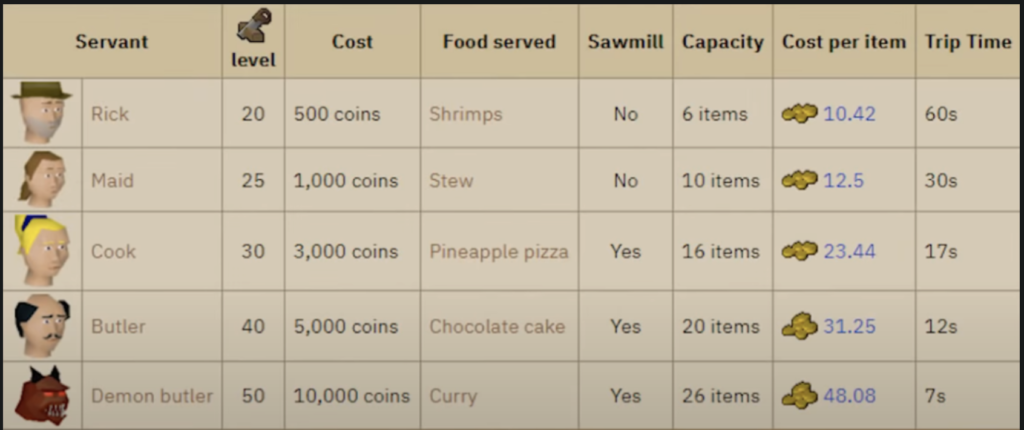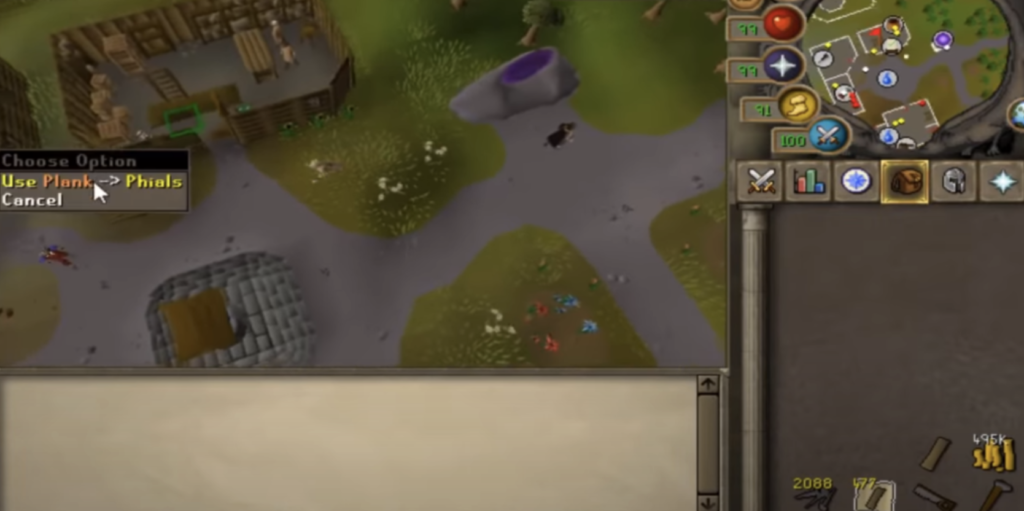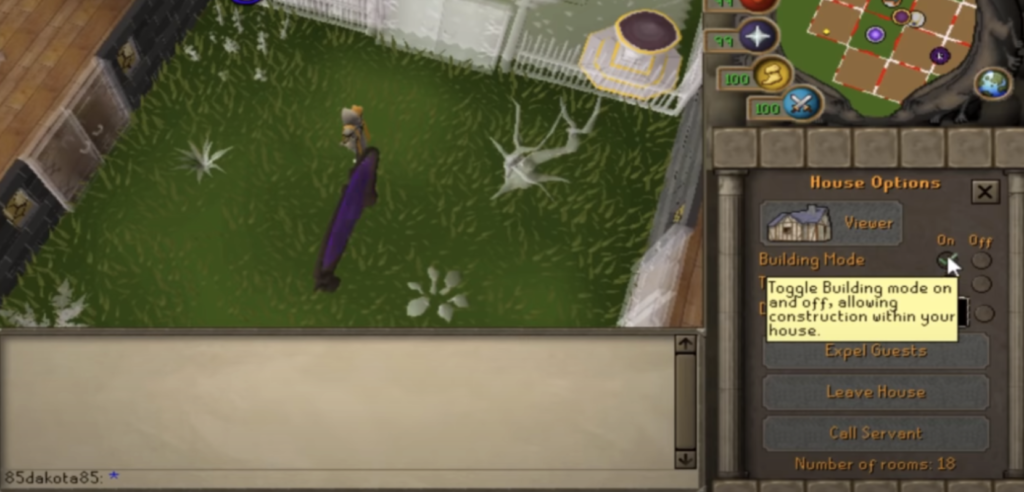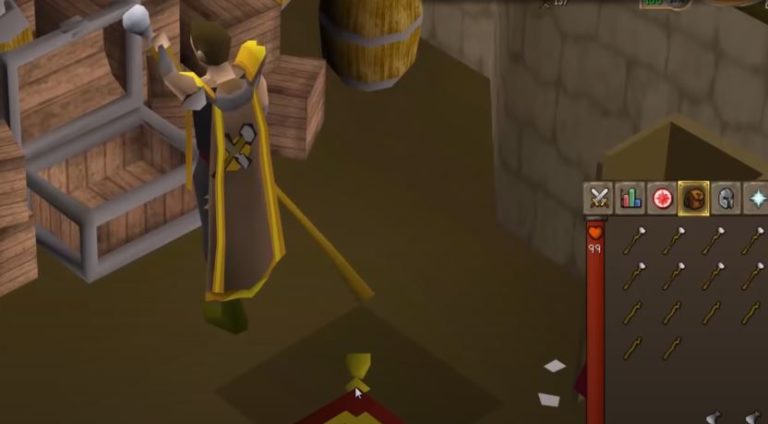In OSRS, Construction is one of the most expensive life skills to train due to the number of resources you need to buy. Therefore it is recommended to go a cheaper route rather than the quickest one.
Buying a House
You can buy a house from any real estate agent in OSRS. There are four of them around Falador, Seer’s Village, Varrock, and East Ardougne.

You are also able to pay these NPCs to change the look or location of your house. However, your first house will always be in Rimmington and costs one thousand coins.
Hiring a Servant
By the time you reach level 20 Construction, you can hire a servant. The Servant House is located in the northeast corner of East Ardougne.

The servants can take noted versions of your planks to the bank and then bring back unnoted planks to you, which will considerably speed up your process.
Each higher-level servant you use costs more money per item, but they can bring back more items at a time, and it takes less time to return from the bank.
Servants

It is recommended to skip the first two servants, RIck and Maid, and hire a servant from Cook and onward. Nevertheless, you have to be at least level 30 Construction to hire a Cook, level 40 for a Butler, and level 50 for a Demon Butler.
There is another method to get your planks unnoted in the early levels.
Phials
You can obtain help from an NPC called Phials who normally located near the store south of the Rimming House Portal.

It costs 5 GP per item, which is cheaper than any of the servants, and it doesn’t take that long to run out there. From personal experience, you should use this method until you have reached level 30 Construction and then switch to a Cook.
Building a Room
Once you have a house, you can now start using your planks. However, you must build a room before you can do this. To build it, you must enter your house in Building mode.

You can do this at the portal outside or from your in-game options at the bottom-left corner. You have to be in Building mode to construct or remove anything.
Once you are inside the house, you will see a bunch of door hotspots, Right-click on one of them, and start building a room. Each room has a separate cost to make. The higher-level rooms cost more money. You can rotate the room however you like, but it doesn’t matter for training. If you want to move the rooms in the future, you can.
Construction Experience
How OSRS calculates construction experience is very straightforward. Each plank is worth a certain amount of fixed experience. Thus your end goal is to use the highest tier plank and as many as you can to earn the highest amount of construction experience.
There are four planks:
The normal plank, oak plank, teak plank, and mahogany plank. Each one yield 29 experience points, 60 experience points, 90 experience points, and 140 experience points, respectively, per plank.
For example, you can use one mahogany plank, but it yields more experience if you use ten oak planks. It is important to consider the tier of the plank and the number of planks you use.
Regarding GP prices, the normal plank costs 9.45 GP per experience, the oak plank 7.03 GP per experience, the teak plank 10.74 GP per experience, and the mahogany plank costs 14.64 GP per experience. Therefore, you must decide whether you will spend more money on higher experience rates or save up some money for slower leveling.
Leveling Guide
Level 1-4 Crude Wooden Chairs
From level 1 Construction, you can build crude wooden chairs. In construction training, the objective is to build the chair, remove it, and repeat it. Each chair requires two planks and two nails per chair. Higher-tier nails have less bending, but it is best to use nails from steel-tier and higher.
Also, you only need to use nails when using regular planks, so they are unnecessary when you move to oak planks. It is advised to buy from 500 to 1000 nails, and they are quite cheap. You build the chairs in the Parlour room and obtain 58 experience per chair. You only need five chairs to reach level 4.
Level 4-9 Wooden Bookcases
At level 4, you can build wooden bookcases. You need four planks and nails per bookcase. You can also build these in the parlor room. You obtain 115 experience per bookcase, and you only need seven bookcases to level up to level 9.
Level 9-22 Wooden Larders
Then, you will move on to wooden larders at level 9, and this is the last item to use regular planks. You need eight planks and nails per larder, and you need to build them in the kitchen. Each larder is 228 experience gained, and you will need to build 21 larders to reach level 22.
Level 22-33 Oak Tables and Carved Oak Tables
Upon reaching level 22, you will now build oak tables, but you have to construct them in the Dining room. You will need from 4 oak planks to build one table. Each table yields 24 experience, and you will need to bull 39 of them to reach level 31. Overall, you will use 216 oak planks to build the required oak tables.
At level 31, you can switch to the carved oak tables, which need six oaks planks to be built. You will earn 360 experience per table, and you must build 33 carved tables to reach level 33.
Level 33-52 Oak Larders
After level 33, you can switch to oak larders, and these are built once again in the kitchen. You will need to use eight oak planks per larder, and you can make from 300k to 400k per hour with this method. Ideally, you will need to build 220 larders to reach level 52 as each one gives 480 experience per piece.
Level 52-99 Mahogany Tables
After level 52 you can start to make Mahogany Tables which yield somewhere around 450-700k exp/hour. You can make the Mahogany Table in the dining room. You will need 15370 Mahogany Tables for 99 construction, which costs around 200 million.
Alternative(Cheaper) Methods For 99 Construction
66-74 Teak Garden Benches
Requires 6 teak planks and yield around 350-450k exp/hour.
74-99 Oak Dungeon Doors
Requires 10 Oak planks to make. You make these in the dungeon room, which you can build in the garden. Provides around 400-500k exp/hour
If you do this route instead, it will only cost around 100 million GP instead of 200 million with the Mahogany Tables.
